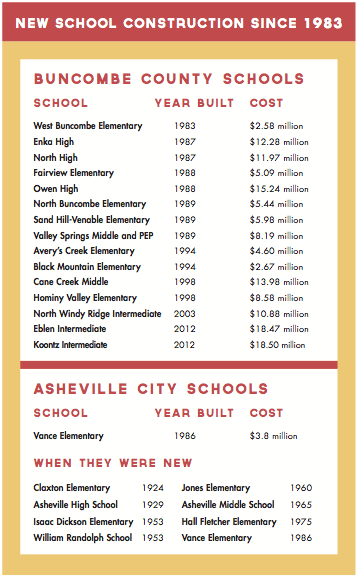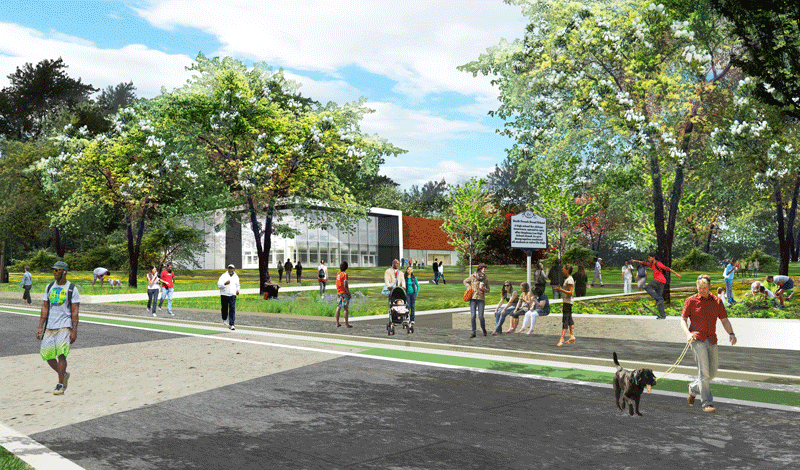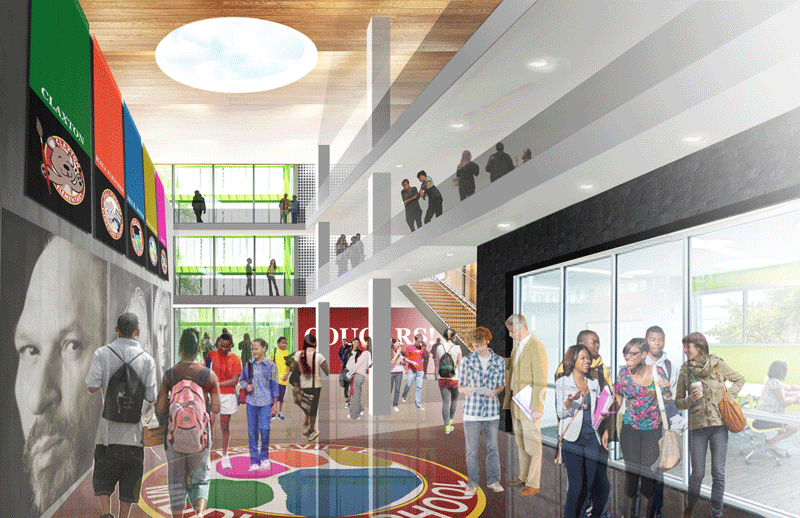
Learning by doing: Proposed features such as outdoor classrooms and a larger community garden would support Isaac Dickson Elementary’s experiential learning theme, officials say. Image courtesy Legerton Architecture and Innovative Design
A looming fight over new homes for Isaac Dickson Elementary and Asheville Middle School is pitting budget-conscious Republicans on the new Buncombe County Board of Commissioners against a razor-thin Democratic majority. Some freshman GOP commissioners say the high-tech designs are a luxury the county can’t afford; Democrats counter that these facilities are urgently needed, and some argue that making them energy-efficient would cut operating costs for decades.
The proposed structures (see sidebar) would be the first new city schools since 1986. In the last three decades, the county system has built 15 school buildings.
A 1983 state law that earmarks a percentage of local sales taxes for school construction but sends most of the money to the county was instrumental in financing those schools. In contrast, the proposed city projects would need an additional funding source, and even proponents say they don’t know where the estimated $61 million or more would come from.

With the commissioners slated to take up these proposals March 5, school officials, teachers and even students have been mounting a full-court press on behalf of the projects. Meanwhile, the future of thousands of local students — and the facilities their counterparts will use for the next several generations — hangs in the balance.
Short term, long term
John Legerton, a lead architect on the Isaac Dickson project, says the proposed structure would be one of the first net-zero-energy schools in the Southeast.

With an eye toward future LEED certification, the plan also calls for 150 geothermal wells (to help with heating and cooling) and using rainwater for toilets and landscape irrigation.
“There’s a lot of environmental components that just fit really well with Isaac Dicksons’s experiential emphasis,” says Legerton; a prominent display would educate students about their own energy use. The architect previously served on the Asheville City Board of Education; his children attended Dickson.
The roof would be designed to accommodate a large solar array, but the panels themselves are not included in the projected price tag. The idea, he explains, is that private investors who “could take advantage of both state and federal solar tax credits, as well as sell the energy back to the electrical grid,” would bid on leasing the roof and adding the panels, generating income for themselves and the school system.
But a similar project planned for Enka High School has been stalled since early last year, when FLS Energy, a local solar developer, backed out due to financing difficulties and delays caused by Progress Energy, reports Tim Fierle, the county schools’ director of facilities.
Legerton’s firm also helped design that project, which Buncombe County Board of Education member Lisa Baldwin branded a “fiasco.” Commissioner Brownie Newman is FLS Energy’s vice president.
Asheville Middle School architect Chad Roberson says he and school officials are “still working through” which environmentally friendly features that project might include, noting that he’s been instructed to consider both the up-front and long-term costs.
Balancing act
Commissioner Mike Fryar, a Republican who made spending cuts a centerpiece of his District 2 campaign, says he’s “skeptical” about the environmental bells and whistles, adding that for him to support these features, school officials need to show him specifically how much money they might save over the long term.
In the Kentucky coal mining town where he attended elementary school, notes Fryar, “If a breeze blew through a window, we were lucky … because the windows were open; we had no air conditioning.”

“They don’t need fancy buildings; you just need good teachers,” he asserts. “I want kids to have a safe place. Do they need a McMansion to go to?”
Commissioner David King thinks there’s “a need to do something about those schools,” though he echoes Fryar’s call for fiscal restraint.
“I get the cutting-edge thing: Everyone wants the best, but you have to balance this with the budget. … When you say ‘cutting edge,’ that sends up a red flag to me,” the District 3 Republican explains. “I know people want very badly for solar to be the way of the future, and I would love that. But speaking about today and spending today’s dollars, I don’t see it.”
He adds: “I think they’re going to have to get their wants more in line with a doable budget.”
Legerton, meanwhile, says almost $1 million dollars’ worth of features could be cut from the Isaac Dickson design, including some outdoor classrooms, a chicken coop, storage areas and landscaping elements. All those features could be added later, he says, if additional funding became available.
Roberson says he’s also drafting a list of possible cuts for Asheville Middle School, though he’s not ready to release details.
But Charlie Glazener, communications director for the Asheville City Schools, says the initial proposals already strike a balance between frugality and ideals.
“In Asheville, which is a special community and a green community, we just need to make them as cutting-edge as they can be,” he maintains. “We only do these new schools over a period of 25 to 50 years. We don’t want our kids to just get by: We want to get it right.”
Both new buildings, he points out, would have significantly smaller auditoriums than the current ones.
“Someone’s going to come along 10 years from now and say, ‘Why didn’t they make an auditorium that was large enough to accommodate a band concert?'” Glazener predicts. “The answer is that the county commissioners have to manage the taxpayers’ money judiciously, and if there’s not enough, that’s a place — I don’t want to say we’re willing to cut, but we’re forced to — you concede.”
Slicing the pie
Thirty years ago, conditions at the Buncombe County Schools ranked among the worst in the country, and in 1983 state lawmakers, believing that local officials weren’t meeting their responsibilities, created a 0.5 percent local sales tax specifically to fund capital improvements for public schools.

Designing an education: The initial design for a new Asheville Middle School aims to facilitate a safer and more collaborative learning environment. It also calls for a new public park. Image courtesy PBC+L Architecture

The two school systems share that revenue proportionally, based on enrollment. But because the county system is so much bigger (about 25,600 students vs. some 4,100 in the city), it received about $11 million last year while the city schools got roughly $1.7 million, according to county Finance Director Donna Clark.
“The way that math works, Asheville City will never have enough money to be able to participate in a significant capital project. It’s just not there,” notes Holly Jones, vice chair of the Board of Commissioners, whose daughter is a fifth-grader at Isaac Dickson. A longtime advocate for the two proposed schools, the District 1 Democrat pushed last year to allocate $1.8 million for architectural plans.
Asheville does have a special property tax for the city system, which brought in about $8 million last year. But that money, says Glazener, is used “almost exclusively” for operations rather than capital needs.
Meanwhile, the county system’s two newest buildings, the Charles T. Koontz Intermediate School in Arden and Joe P. Eblen Intermediate in Erwin, were completed last year. Each cost about $18.5 million, serves roughly 800 fifth- and sixth-grade students, and is LEED-certified. The county’s share of the sales tax money is paying for both those schools. And on Feb. 19, the commissioners approved a special $5.5 million science high school for the county, funded by lottery and sales tax revenues (see “Growing a STEM”).
Jan Blunt, communications director for the Buncombe County Schools, says the current distribution method simply gives the county system its “fair share.” And while no new school construction projects are expected through at least 2020, she reports, the 42 existing schools need constant maintenance.
Jones, however, says a “visceral” tour of Asheville Middle drove home to her how urgently the new city facilities are needed.
“There’s no other capital need in this county that’s more important than those two schools right now,” she declares. “They trump any other request or idea or need tenfold. Those schools are ancient and in bad shape.”
“When people relocate to the area,” notes Jones, “if you ask realtors, the first question they ask is about the schools. If we don’t have a good school product, we’re tying our hands when it comes to recruiting prospective employers and good professionals, entrepreneurs, the whole nine yards.”
The road forward
Jones’ Democratic colleagues on the board — Chair David Gantt and freshman commissioners Ellen Frost and Newman — have all voiced support for the projects as well.
Those four votes would be enough to approve the new schools, but that still leaves the overarching question of how to pay for them.
“There’s a lot of different ways you can do it,” notes County Manager Wanda Greene, but “The bottom line is we’re going to have to have some additional funding to pay the debt service on these facilities.” In the coming weeks, she says, she’ll draft a list of possible scenarios to present to the board for potential inclusion in the budget for the next fiscal year, which begins July 1.
And though Gantt maintains that “Everything’s on the table,” commissioners on both sides of the aisle say they’d rather not see a referendum on the issue in November.
“You’re never going to pass something like that in the county,” King asserts. All three Republican commissioners represent outlying districts; Jones and Newman’s district covers Asheville.
Fryar, meanwhile, feels this is an opportune time to broach the subject of consolidating the two school systems. “The city’s not going to like it,” he predicts. “They all need to be combined in the county to save us all money.” Only 11 of the state’s 100 counties maintain separate city and county systems, Greene reports.
Glazener, however, says he’s hopeful the commissioners will green-light both building projects; if they do, construction on the new Isaac Dickson would begin in July.
“We think the need’s there, and when they see that, they’ll do the right thing,” he says.
As for the funding, notes Jones, “It’s unclear to me at this point what the road forward is, but everyone’s asking the questions.”
Jake Frankel can be reached at 251-1333, ext. 115, or at jfrankel@mountainx.com.




Here is a link to video of Buncombe County Board of Education discussion of Enka Solar Initiative. Solar discussion begins 48:00 into footage. http://www.youtube.com/watch?v=ifOCnkSaxFA
My big question is why there is no legal recourse for FLS failing to meet their responsibility in this. BCBOE attorney Chris Campbell was paid $8,000. to write up this contract…but no protection???